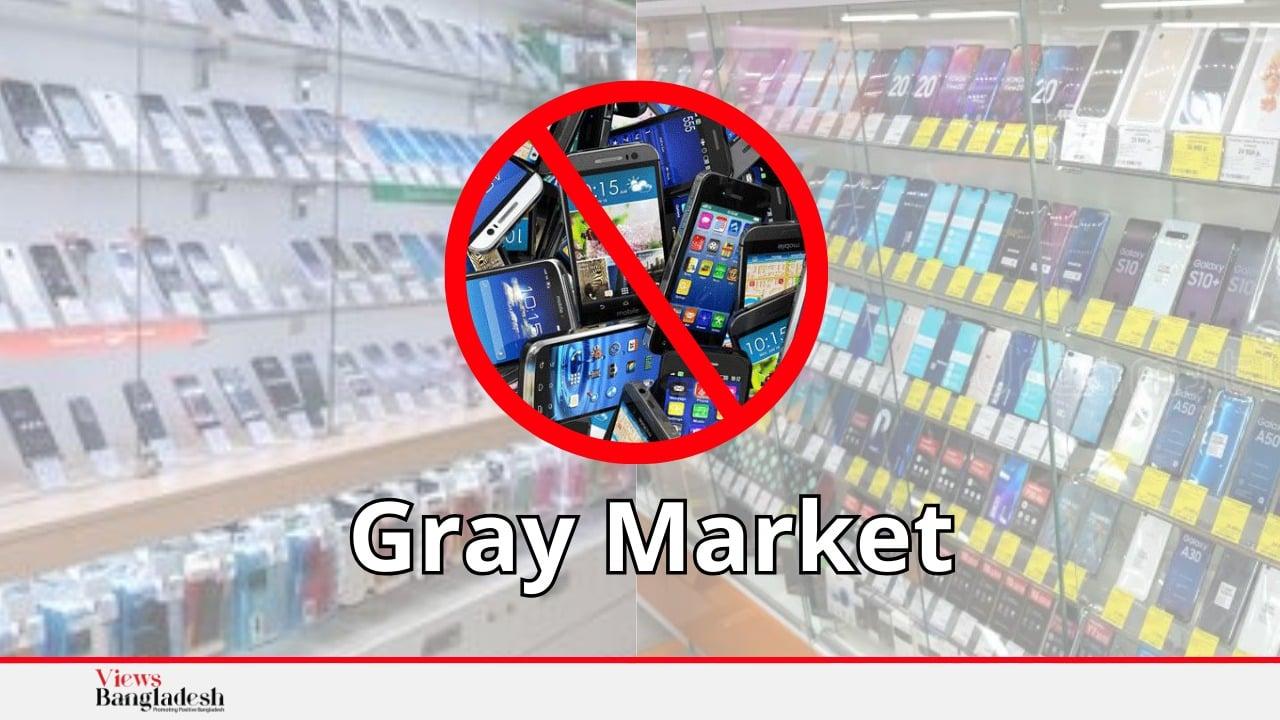Anticipating success from state minister Palak's directive
Crafting control in illicit mobile handset markets

Zunaid Ahmed Palak, the Minister of State for the concerned Ministry, has conveyed a strong message underscoring the imperative need for mobile handset registration in the country. The scope of his responsibilities has broadened following the recent oath-taking ceremony. Formerly occupying the position of Minister of State for the Information and Communication Technology (ICT) Department, he currently serves as the Minister of State for the Ministry of Posts, Telecommunications, and Information Technology in the present government.
Given Zunaid Ahmed Palak's tenure in the cabinet during the preceding two terms, it is presumed that he possesses a comprehensive understanding of the intricacies involved in the registration of mobile handsets in the NEIR (National Equipment Identity Register) database of the Bangladesh Telecommunication Regulatory Commission (BTRC). Consequently, exercising prudence, he must implement practical measures to prevent the recurrence of past complications in the ongoing initiatives.
One crucial distinction to bear in mind is that SIM card registration and mobile handset registration are not identical processes. When a subscriber acquires a SIM card or connects to a specific operator's mobile network, their mobile phone number becomes a lifelong attribute. Consequently, once a number is registered in the database against a person or customer, it becomes uniquely specific. If the number of mobile subscribers in the country is 19 crore, then 19 crore numbers will be registered. Any increase in this number will be subsequently added.
However, handsets undergo frequent changes. Typically, a customer replaces their handset every three years, and some individuals prefer to change their handsets annually. Moreover, after acquiring a new handset, individuals often pass the old one to a relative. Consequently, the handset is not registered under a person's name; instead, the unique identification number or International Mobile Equipment Identification (IMEI) number of the handset is registered in the database of the relevant authorities. This leads to a substantial addition of IMEI numbers to the database server each year. For instance, if 1 crore units of handsets are sold annually in the domestic market, 1 crore new IMEI numbers will be added each year. Simultaneously, the old numbers will persist. Consequently, the management of the IMEI database is relatively intricate, requiring a server with very high storage capacity.
As of July 1, 2021, the Bangladesh Telecommunication Regulatory Commission (BTRC) introduced the NEIR server system. According to the announcement, mobile handsets with unregistered IMEI numbers would no longer be operational on the mobile operator's network. Existing handsets in use by customers were supposed to be automatically registered. Additionally, the BTRC provided guidelines for registering IMEI numbers for handsets purchased internationally.
However, despite the initial positive intentions, challenges arose, particularly in the registration process for bringing handsets from abroad into the country. The complications in this process prompted the BTRC to discreetly relax the IMEI registration system, rendering the NEIR server system non-functional. The specific reasons for these complications have not been disclosed.
Indeed, a conspicuous occurrence unfolded right before our eyes. People who were caught selling illegal phones had their shops raided multiple times, and the phones were taken away. Surprisingly, their business didn't stop. This is because they have proper licenses to do business, and their licenses were never taken away, even though they were selling fake products. Paradoxically, these legitimate traders have pointed accusatory fingers at the BTRC and customs authorities, asserting that they, as lawful business entities, have been unfairly targeted. They claim credit for providing customers with high-quality products at economical prices. Undeterred, they expanded their operations by establishing more outlets in prominent shopping malls, launching their e-commerce platforms, and actively promoting their products on Facebook and YouTube.
Brand new handsets, untouched by refurbishment or previous usage, persistently find their way into the market through illicit technology channels, offering remarkable prices. For instance, in March 2023, the Samsung S23 series (12GB/256GB) smartphones debuted in the country. Notably, the official price for the S23 Ultra model was set at Tk 1,97,000. On the global market, Samsung priced it at USD 1,600. However, since March, there have been reports of these devices being advertised on the web pages of unauthorized vendors for Tk 130,000.
Typically, refurbished phones take a minimum of six months to resurface in the market, while used phones become available after at least a year. This raises a perplexing question: How do the orchestrators of this illicit trade manage to offer new handsets at prices lower than those set by Samsung in the international market? Equally astonishing is the fact that every time Samsung reduces prices globally, these unauthorized sellers adjust their prices accordingly.
Speaking of these outlets, we and the state minister are aware, as are the relevant authorities and, to a large extent, the masterminds behind the illegal importation of technology products. Consequently, no action has been taken knowingly, allowing them to conduct business without apprehension. Meanwhile, those aspiring to establish 'Made in Bangladesh' in the information technology sector, having invested money borrowed from banks to set up handset manufacturing factories and generating employment for thousands, find themselves on the brink of collapse. Illegal traders operate tax-free and without charges, while legal factory owners bear the weight of taxes, debts, unsold product liabilities, and concerns about the timely payment of factory workers.
To safeguard these entrepreneurs, it is imperative to curb illegal traders. However, delivering a strong message from the state minister in one or two meetings will not suffice to halt their activities. They may momentarily reconsider, perhaps smile, or do a little more. The first step in thwarting these traders is to address the root of the issue. Initiating the cancellation of their trade licenses for dealing in tax-evasion products should be the foremost decision. Consistent raids and the revocation of their trade licenses will inflict significant damage on their business foundations. Additionally, their e-commerce activities, conducted through their domains and Facebook pages, should be forcefully terminated.
Secondly, it is crucial to determine the current number of handsets with unregistered IMEI numbers. This task is not challenging, as the activation of a SIM card in a handset automatically includes the IMEI number in the respective mobile operator's database, rendering it active. Consequently, by calculating the total active IMEI numbers in the networks of the four mobile operators and cross-referencing them with the numbers registered on the NEIR server of BTRC, the count of unregistered IMEI numbers in the country can be obtained. Subsequently, these unregistered handsets should undergo automatic registration before progressing to the next step.
I respectfully differ on this point and emphasize the direct involvement of mobile operators rather than BTRC in the registration of new IMEI numbers. Each operator operates customer service centres and online platforms with customer service systems. Hence, facilitating the registration of the IMEI number of a newly imported handset at the customer care centre of the operator where the SIM card will be installed is relatively straightforward. Upon bringing the handset to the customer care centre, information such as the country of origin, the name of the individual importing it, and their passport number should be recorded in the database. This data can then be transmitted to the NEIR server of BTRC for the registration of the IMEI of the handset.
Afterwards, the SIM card will be installed by customer service staff upon receiving the registration confirmation message. In some instances, customers may receive phones as gifts without having a sales receipt. In such cases, individuals bringing handsets from abroad must include the IMEI number in the database, along with their passport number. This process should not be overly complicated, as gifts are typically brought from abroad by close relatives or very close acquaintances. Therefore, obtaining their passport number should not pose a significant challenge when dealing with gift transactions. It is important to note that no more than two handsets can be registered against one passport, and registration will not occur unless it is confirmed as a gift or a purchase from abroad. In cases of uncertainty, any issues can be easily resolved by searching for the passport number.
I would advise utilizing the operator's customer care centre, given that operators have more manpower compared to the BTRC. If necessary, operators can hire additional personnel or open new customer service centres. Considering the existing manpower crisis faced by the BTRC, imposing a new significant responsibility on them would equate to placing a substantial burden on BTRC stakeholders and could be viewed as inhumane. Instead, it is more practical to leverage the customer care centres of mobile operators under the supervision of the BTRC.
The implementation of the message conveyed by the Minister of State for Information Technology is crucial for the industrialists of 'Made in Bangladesh.' However, there must be no weaknesses in the implementation process, as any shortcomings could be exploited by individuals with malicious intent to smuggle technological products. We hope that State Minister Zunaid Ahmed Palak's message will succeed as a concrete step toward the desired objectives.
Author: Journalist and IT analyst


Leave A Comment
You need login first to leave a comment